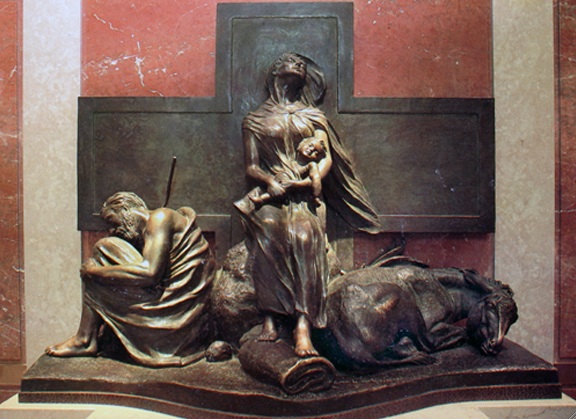A couple of years ago, in my capacity as President of the Glenmary Missioners, I was visiting one of our priests in south Georgia. It was February, cold and gloomy, and we had spent an entire day driving around three counties. As we drove, Fr. Vick pointed out the different trailer parks — each one more rundown and dilapidated than the other. He noted the individual trailers and the fact that six men lived in one, a family of eight in another, and so on. Because of their questionable legal status the occupants were paying top dollar in rent.
Finally, late in the afternoon, we stopped in the tiny hamlet of Stillmore, population 500. The town is located alongside a poultry processing plant and almost all its inhabitants are employed at the plant. Fr. Vick asked if it was okay to make a brief stop. He needed to drop off supplies to some “new arrivals”– a few personal hygiene items along with some food to last them until they could begin work at the plant the following Monday.
Inside a dimly lit, chilly shack were three teenagers – a boy, 17, his sister,16, and another sister, 15. They had arrived the day before after a dangerous and exhausting coyote-led journey from central Mexico. The look of fear and bewilderment on their faces remains imprinted on my memory to this day. As they spoke haltingly in hushed tones to Fr. Vick, I thought of my own nieces and nephews who were their age, and inwardly I wept for what they had endured and what they would endure in the future.
What is the faith response to the estimated 11 million illegal immigrants currently living in the United States? What is the response of those of us of Irish descent whose ancestors more often than not fled Ireland because of economic deprivation or religious persecution?
Biblically it is clear what is expected of us. Both the Old and New Testaments tell compelling stories of refugees forced to flee because of oppression. Exodus tells the story of the Israelites who were victims of bitter slavery in Egypt. For 40 years they lived as wanderers until God fulfilled his ancient promise and settled them on land they could finally call home.
The Israelites’ experience was so painful and frightening that God ordered his people for all time to have special care for the alien. “You shall treat the alien who resides with you no differently than the natives born among you; have the same love for him as for yourself; for you too were once aliens in the land of Egypt.”(Lv19:33-34). In the Gospel of St. Matthew we are told to “welcome the stranger,” and reminded, “As you did it to one of the least of these my brethren, you did it to me” (25:35, 40).
In his powerful encyclical, Deus Caritas Est, Pope Benedict XVI reminded us that Jesus calls us to expand on who we see as neighbor. Citing the parable of the Good Samaritan, Benedict said that the term neighbor can no longer be limited to “the closely knit community of a single country or people. This limit is now abolished. Anyone who needs me, and whom I can help, is my neighbor…. ‘As you did it to one of the least of these my brethren, you did it to me’ (Mt 25:40). Love of God and love of neighbor have become one: in the least of the brethren we find Jesus himself, and in Jesus we find God.” (par. 15).
Is not our neighbor the immigrant who lives in the shadows?
At the east entrance to the crypt of the Roman Catholic Basilica of the National Shrine of the Immaculate Conception in Washington, D.C., stands a sculpture of the Holy Family resting from their flight into Egypt. Their fatigue and weariness are poignantly captured in this work by Anna Hyatt Huntington. It is a powerful image to reflect upon as the intense debate around immigration and the place of illegal immigrants within our society intensifies.
I do not support or encourage illegal immigration, but in my ministry I have witnessed family separation, exploitation, and the loss of life caused by the current system. Millions remain in the shadows, marginalized from society without legal protection. This suffering must end.
As Irish Americans we can offer a unique and rich perspective given our history, an aspect of which is our ability to identify with and assist the poor, the voiceless, the “alien” in our midst. I am asking you to please join me in advocating and supporting comprehensive immigration reform that would allow people to enter the United States legally in order to work and support their families.
Let us Irish Americans never forget… we “were once aliens in the land…”


Secure borders with Catholic charity toward all is the only way to go.